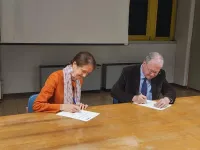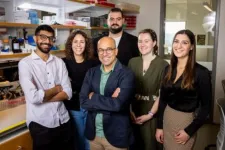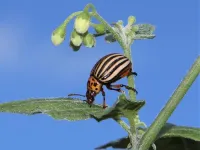(Press-News.org) FAPESP representatives visited the headquarters of Italy’s Consiglio Nazionale delle Ricerche (CNR) in Bologna on October 16th to sign a new work plan that will enable the implementation of a cooperation agreement signed by the institutions in December 2023.
The aim is to enable joint funding of research projects in the following areas: Cultures, Inmaterial Heritage, Interdisciplinary Networks; Agri-food and Sustainable Development; Technology and Innovation; and Health and the Environment.
Researcher mobility and other mutually agreed cooperative initiatives may also be funded.
The document, which was signed by Virginia Coda, head of International Relations at the CNR, and Marco Antonio Zago, president of FAPESP, establishes that a joint call for proposals will be announced every two years, with the first one scheduled for April 2025. Two-year projects will be supported.
“We believe that, as always, many researchers will submit projects because the link between Brazil and Italy is extremely strong. We’re really happy, we feel a strong connection with Brazil. All Italians,” said Coda.
“It’s a pleasure to be here again. FAPESP’s first agreement with the CNR was signed in 2012, when I was Dean of Research at the University of São Paulo. And we’ve renewed this partnership many times. This provides a special opportunity for collaboration between Italy and the state of São Paulo,” noted Zago.
END
FAPESP and CNR plan to launch joint call for proposals in April 2025
The work plan for the next five years was signed by representatives of the two agencies on October 16th in Bologna.
2024-10-17
ELSE PRESS RELEASES FROM THIS DATE:
Smaller, more specific academic journals have more sway over policy
2024-10-17
DURHAM, N.C. – Scientists don't just want their results to be published; they want them to be published in the most influential journal they can find. This focus on a high 'impact factor' is driven by their concerns about promotion and tenure, but it may be overlooking the important role that smaller publications can play in the advancement of their science.
A new paper, “Role of low-impact-factor journals in conservation implementation,” appearing Oct. 17 in the journal Conservation ...
Medicaid ACOs have not yet improved care for kids with asthma
2024-10-17
In its first three years of operation, Medicaid’s primary care-focused Accountable Care Organizations (ACOs) in Massachusetts showed “no clear evidence of success” in improving asthma care for children, according to research led by the University of Massachusetts Amherst and UMass Chan Medical School-Baystate Health.
The study, published recently in JAMA Pediatrics, compared the asthma care of Medicaid-insured children affiliated with a Medicaid ACO to that of children with private insurance. Senior author Dr. Sarah Goff, a practicing pediatrician and internist ...
New study sheds light on lily toxicity in cats; outpatient treatment may be viable option
2024-10-17
FOR MORE INFORMATION
Michael San Filippo
Senior Media Relations Manager
American Veterinary Medical Association
Cell/Text: 847-732-6194
msanfilippo@avma.org
New study sheds light on lily toxicity in cats; outpatient treatment may be viable option
(SCHAUMBURG, Illinois) October 17, 2024—A study published recently in the Journal of the American Veterinary Medical Association (JAVMA) has revealed new insights into the treatment of cats exposed to toxic lilies, offering hope for pet owners facing this common household hazard.
The study (“Prevalence of acute kidney ...
A new benchmark to recognize the hardest problems in materials science
2024-10-17
Scientists hope that quantum computing will help them study complex phenomena that have so far proven challenging for current computers – including the properties of new and exotic materials. But despite the hype surrounding each new claim of “quantum supremacy”, there is no easy way to say when quantum computers and quantum algorithms have a clear and practical advantage over classical ones.
A large collaboration led by Giuseppe Carleo, a physicist at the Swiss Federal Institute for Technology (EPFL) in Lausane and the member of the National Center for Competence in Research NCCR MARVEL, has now ...
Why do we love carbs? The origins predate agriculture and maybe even our split from Neanderthals
2024-10-17
If you’ve ever struggled to reduce your carb intake, ancient DNA might be to blame.
It has long been known that humans carry multiple copies of a gene that allows us to begin breaking down complex carbohydrate starch in the mouth, providing the first step in metabolizing starchy foods like bread and pasta. However, it has been notoriously difficult for researchers to determine how and when the number of these genes expanded. Now a new study led by The University of Buffalo (UB) and The Jackson Laboratory (JAX) showcases how early duplications of this ...
Key protein for the biosynthesis of defense steroids in solanaceous plants discovered
2024-10-17
The biosynthetic pathway of specific steroidal compounds in nightshade plants (such as potatoes, tomatoes and eggplants) starts with cholesterol. Several studies have investigated the enzymes involved in the formation of steroidal glycoalkaloids. Although the genes responsible for producing the scaffolds of steroidal specialized metabolites are known, successfully reconstituting of these compounds in other plants has not yet been achieved. The project group ‘Specialized Steroid Metabolism in Plants’ in the Department of Natural Product Biosynthesis, led by Prashant Sonawane, who is now Assistant ...
Global CO2 emissions from forest fires increase by 60%
2024-10-17
A major new study reveals that carbon dioxide (CO2) emissions from forest fires have surged by 60% globally since 2001, and almost tripled in some of the most climate-sensitive northern boreal forests.
The study, led by the University of East Anglia (UEA) and published today in Science, grouped areas of the world into ‘pyromes’ - regions where forest fire patterns are affected by similar environmental, human, and climatic controls - revealing the key factors driving recent increases in forest fire activity.
It is one of the first studies to look globally at the differences between forest ...
AI-assisted deliberation can help people with different views find common ground
2024-10-17
A new study shows that an artificial intelligence (AI) tool can help people with different views find common ground by more effectively summarizing the collective opinion of the group than humans. By producing statements that convey the majority opinion, while incorporating the minority’s perspective, the AI produced outputs that participants preferred—and that they rated as more informative, clear, and unbiased, compared to those written by human mediators. Human society is enriched by a plurality of viewpoints, but agreement is a prerequisite for people to act collectively. ...
Special Issue explores factors influencing democratic attitudes, and what’s at stake for science in the U.S. after November election
2024-10-17
The health of American democracy is facing challenges, with experts pointing to recent democratic backsliding, deepening partisan divisions, and growing anti-democratic attitudes and rhetoric. In this issue of Science, Research Articles, a Policy Forum, a Science News feature, and a related Editorial highlight how the tools of science and technology are being used to address this growing concern and how the upcoming U.S. presidential election could impact U.S. science.
In one research study in this special issue, Jonathan Chu and colleagues sought to understand whether understandings ...
Extratropical forest fire emissions are increasing as climate changes
2024-10-17
As climate change promotes fire-favorable weather, climate-driven wildfires in extratropical forests have overtaken tropical forests as the leading source of global fire emissions, researchers report. The findings raise urgent concerns about the future of forest carbon sinks under climate change. Fire has long played a role in shaping Earth's forests and regulating carbon storage in ecosystems. However, anthropogenic climate change has intensified fire-prone weather, leading to an increase in burned areas and carbon emissions, particularly in forested regions. These fires not only reduce forests' ability to absorb carbon but also disrupt ecosystems, harm biodiversity, and pose significant ...
LAST 30 PRESS RELEASES:
New knowledge on heritability paves the way for better treatment of people with chronic inflammatory bowel disease
Under the Lens: Microbiologists Nicola Holden and Gil Domingue weigh in on the raw milk debate
Science reveals why you can’t resist a snack – even when you’re full
Kidney cancer study finds belzutifan plus pembrolizumab post-surgery helps patients at high risk for relapse stay cancer-free longer
Alkali cation effects in electrochemical carbon dioxide reduction
Test platforms for charging wireless cars now fit on a bench
$3 million NIH grant funds national study of Medicare Advantage’s benefit expansion into social supports
Amplified Sciences achieves CAP accreditation for cutting-edge diagnostic lab
Fred Hutch announces 12 recipients of the annual Harold M. Weintraub Graduate Student Award
Native forest litter helps rebuild soil life in post-mining landscapes
Mountain soils in arid regions may emit more greenhouse gas as climate shifts, new study finds
Pairing biochar with other soil amendments could unlock stronger gains in soil health
Why do we get a skip in our step when we’re happy? Thank dopamine
UC Irvine scientists uncover cellular mechanism behind muscle repair
Platform to map living brain noninvasively takes next big step
Stress-testing the Cascadia Subduction Zone reveals variability that could impact how earthquakes spread
We may be underestimating the true carbon cost of northern wildfires
Blood test predicts which bladder cancer patients may safely skip surgery
Kennesaw State's Vijay Anand honored as National Academy of Inventors Senior Member
Recovery from whaling reveals the role of age in Humpback reproduction
Can the canny tick help prevent disease like MS and cancer?
Newcomer children show lower rates of emergency department use for non‑urgent conditions, study finds
Cognitive and neuropsychiatric function in former American football players
From trash to climate tech: rubber gloves find new life as carbon capturers materials
A step towards needed treatments for hantaviruses in new molecular map
Boys are more motivated, while girls are more compassionate?
Study identifies opposing roles for IL6 and IL6R in long-term mortality
AI accurately spots medical disorder from privacy-conscious hand images
Transient Pauli blocking for broadband ultrafast optical switching
Political polarization can spur CO2 emissions, stymie climate action
[Press-News.org] FAPESP and CNR plan to launch joint call for proposals in April 2025The work plan for the next five years was signed by representatives of the two agencies on October 16th in Bologna.



